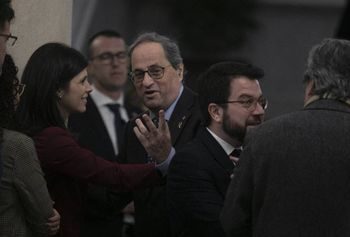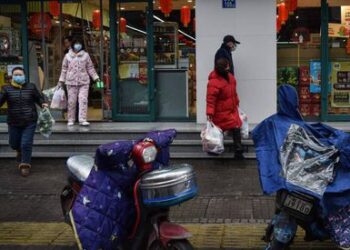
As the month of December approaches and temperatures continue to drop, dozens of people who have fled their country wait in line outside the Samur Social, Madrid’s municipal social assistance service. They are there for hours, and in many cases end up sleeping on the street so as to not lose their place in the line. This is the image of Madrid these days: children on the street and locals lending a hand, while city officials and the central government stand by.
“They say that if you’re persistent, they will see you, they’ll call you first,” says Danelis del Carmen, a 25-year-old Venezuelan student whose tired eyes peek out through her thick white scarf. Del Carmen and her 18-year-old brother have spent three nights outside Samur Social “just in case” a bed becomes free.
There is another truth: “When the TV cameras show up, free spaces appear that weren’t there before,” says a social worker from the Samur Social center in La Latina, in downtown Madrid.
When the TV cameras arrive, free spaces appear that weren’t there before
Social worker from La Latina Samur center
“No Samur Social worker would tell them that there are no beds knowing that there were. Beds don’t become free at midnight,” she adds. “There is media pressure and it is the bosses who do whatever it takes to get families off the streets. It’s not that spaces suddenly become available, it’s that the television attention creates spaces where there are none.”
Madrid has the same number of available spaces as last year: 479 for overnight stays and 30 spaces in day centers, which are open every year from November 25 to March 31 to provide shelter to homeless people during the coldest months. In mid-September, 150 of these beds were made available on an exceptional basis to give shelter to the refugees who had been sleeping outside the Samur Social building for several months.
But this emergency measure did not last long. According to the Madrid department of families, equality and social welfare, which is headed by José Aniorte from the center-right party Ciudadanos (Citizens), these spaces were gradually eliminated just before the city of Madrid offered the Ministry of Migration, which is in charge of refugees, a building in Cercedilla, 57 kilometers from the center of Madrid, to accommodate the asylum seekers.

The resources set aside for the winter campaign have not been fully used even though the emergency was evident ahead of Monday, the day that the winter campaign officially started. Workers from Samur Social have been taking information from the same people day after day, and giving them the same response: “There are no beds.” More than 500 spaces were in fact free, but they were reserved until November 25.
“Due to contract issues, we cannot open [these spaces] before November 25; if we knowingly failed to comply with [the contract clauses], we would expose ourselves to serious consequences,” said a Madrid city official last week. The local government complains about the lack of resources, arguing that managing refugees is the responsibility of the central government, and not local authorities. “I wish we could open 10,000 spaces and solve the refugee problem, but the budget [€4.7 billion for 2020] is what it is,” said this source.
While municipal and national authorities try to figure it out, it’s the locals who have been helping the refugees find shelter: they pay for them to stay in guesthouses, let them sleep in their own homes or take them to parish churches such as San Carlos Borromeo. The locals are clear: “No child is going to sleep on the street around here,” say the volunteers who come to Samur Social every day.
Refugees arrive in Madrid but they come to Spain. Welcoming them is a national duty
José Aniorte, Madrid councilor for social welfare
This year the number of asylum seekers who arrived in Madrid through Madrid-Barajas airport has more than doubled from 20,500 to 50,000, according to data that Councilor José Aniorte shared last Tuesday at a municipal committee meeting. Once in the country, the refugees go to the Aluche National Police Station to get an appointment to start the process of requesting international protection. “Last year we gave out a maximum of 200 appointments a day, now we have had two months where we’ve been giving out more than 600 in one morning,” says Manuel Páez, a police chief in charge of processing asylum requests.
For some, the process will end at the doors of Samur Social. At first, the response will be the same: there are no beds. Then local volunteers will show up to help the families. And with some luck, TV cameras will arrive and magically, beds will become available.
On November 21, after the publication of the Spanish version of this article in EL PAÍS, Aniorte sent a letter to Magdalena Valerio, the national minister for migration, whose department is responsible for taking in asylum seekers. The letter urges the government to meet with them on November 29 to tackle this social emergency together.
“Barajas airport has become Spain’s main border. Today, thousands of families have received assistance through the city’s emergency network, but this is insufficient for the huge influx of applicants whose accommodation is the government’s responsibility,” writes Aniorte in a letter which has been shared on social media. It also invites organizations such as the United Nation’s children’s agency UNICEF and refugee office UNHCR, as well as Save the Children to join the meeting. According to the councilor, “[the refugees] arrive in Madrid but they come to Spain. Welcoming them is a national duty.”
English version by Alicia Kember.
Get real time update about this post categories directly on your device, subscribe now.





















